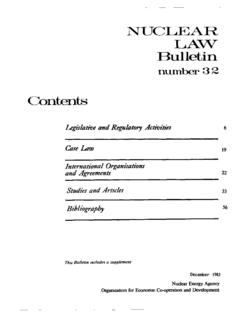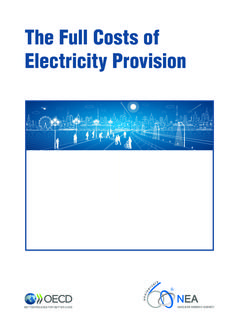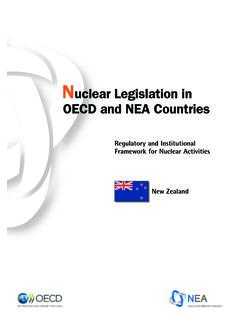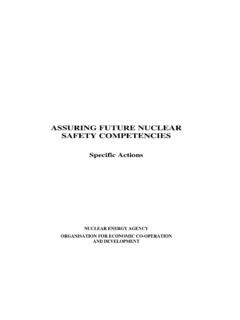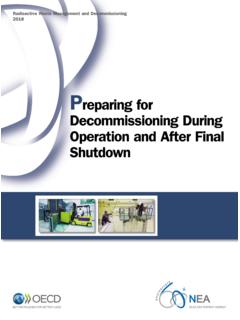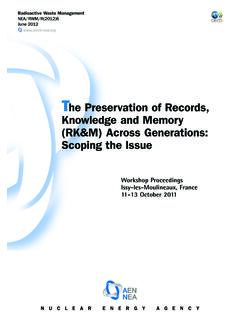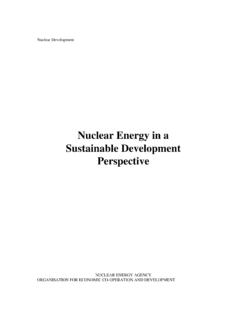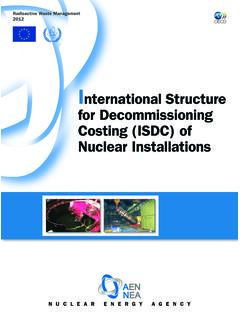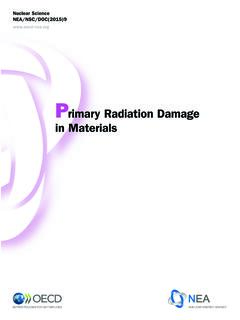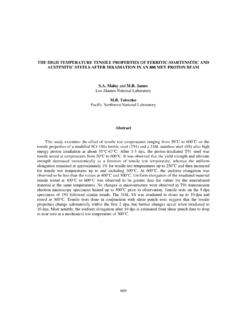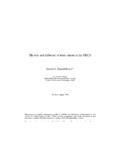Transcription of Nuclear Education and Training: Cause for Concern?
1 Nuclear Education AND TRAININGC ause for Concern? A Summary ReportNUCLEAR ENERGY AGENCYORGANISATION FOR ECONOMIC CO-OPERATION AND DEVELOPMENTORGANISATION FOR ECONOMIC CO-OPERATION AND DEVELOPMENTP ursuant to Article 1 of the Convention signed in Paris on 14th December 1960, and which came intoforce on 30th September 1961, the Organisation for Economic Co-operation and Development (OECD) shallpromote policies designed: to achieve the highest sustainable economic growth and employment and a rising standard ofliving in Member countries, while maintaining financial stability, and thus to contribute to thedevelopment of the world economy; to contribute to sound economic expansion in Member as well as non-member countries in theprocess of economic development; and to contribute to the expansion of world trade on a multilateral, non-discriminatory basis inaccordance with international original Member countries of the OECD are Austria, Belgium, Canada, Denmark, France,Germany, Greece, Iceland, Ireland, Italy, Luxembourg, the Netherlands, Norway, Portugal, Spain, sweden ,Switzerland, Turkey, the United Kingdom and the United States.
2 The following countries became Memberssubsequently through accession at the dates indicated hereafter: Japan (28th April 1964), Finland (28thJanuary 1969), Australia (7th June 1971), New Zealand (29th May 1973), Mexico (18th May 1994), theCzech Republic (21st December 1995), Hungary (7th May 1996), Poland (22nd November 1996) and theRepublic of Korea (12th December 1996). The Commission of the European Communities takes part in thework of the OECD (Article 13 of the OECD Convention). Nuclear ENERGY AGENCYThe OECD Nuclear Energy Agency (NEA) was established on 1st February 1958 under the name ofthe OEEC European Nuclear Energy Agency. It received its present designation on 20th April 1972, whenJapan became its first non-European full Member. NEA membership today consists of 27 OECD Membercountries: Australia, Austria, Belgium, Canada, Czech Republic, Denmark, Finland, France, Germany,Greece, Hungary, Iceland, Ireland, Italy, Japan, Luxembourg, Mexico, the Netherlands, Norway, Portugal,Republic of Korea, Spain, sweden , Switzerland, Turkey, the United Kingdom and the United States.
3 TheCommission of the European Communities also takes part in the work of the mission of the NEA is: to assist its Member countries in maintaining and further developing, through international co-operation, the scientific, technological and legal bases required for a safe, environmentallyfriendly and economical use of Nuclear energy for peaceful purposes, as well as to provide authoritative assessments and to forge common understandings on key issues, as inputto government decisions on Nuclear energy policy and to broader OECD policy analyses in areassuch as energy and sustainable areas of competence of the NEA include safety and regulation of Nuclear activities, radioactivewaste management, radiological protection, Nuclear science, economic and technical analyses of the nuclearfuel cycle, Nuclear law and liability, and public information. The NEA Data Bank provides Nuclear data andcomputer program services for participating these and related tasks, the NEA works in close collaboration with the International Atomic EnergyAgency in Vienna, with which it has a Co-operation Agreement, as well as with other internationalorganisations in the Nuclear en fran ais sous le titre :Enseignement et formation dans le domaine nucl aire :faut-il s inqui ter ?
4 OECD 2000 Permission to reproduce a portion of this work for non-commercial purposes or classroom use shouldbe obtained through the Centre fran ais d exploitation du droit de copie (CCF), 20, rue des Grands-Augustins,75006 Paris, France, Tel. (33-1) 44 07 47 70, Fax (33-1) 46 34 67 19, for every country except the UnitedStates. In the United States permission should be obtained through the Copyright Clearance Center, CustomerService, (508)750-8400, 222 Rosewood Drive, Danvers, MA 01923, USA, or CCC Online: All other applications for permission to reproduce or translate all or part of thisbook should be made to OECD Publications, 2, rue Andr -Pascal, 75775 Paris Cedex 16, OF CONTENTSEXECUTIVE THE DETERIORATION OF Nuclear THE STATUS OF IN-HOUSE causes FOR EFFORTS TO ENCOURAGE THE YOUNGER GENERATION23VI. THE IMPORTANT ROLE OF GOVERNMENTS INNUCLEAR Education .
5 29 VII. RECOMMENDATIONS ..31We must act role of governments ..32 The challenges of revitalising Nuclear Education ..34 Vigorous research and maintaining high-quality of collaboration and sharing best SUMMARYThis report is a summary of the study Nuclear Education and training : Cause for Concern? , which was undertaken to consider the concerns raised bythe OECD/NEA Member countries that Nuclear Education and training isdecreasing, perhaps to problematic now enjoys many benefits from Nuclear -related technology inareas as diverse as medicine and advanced materials, as well as electricityproduction. Today, Nuclear technology is widespread and multidisciplinary. Yetthe advancement of this technology, with all its associated benefits, will bethreatened, even curtailed, unless the declining number of university coursesassociated with it, and the declining interest among students in it, is most countries there are now fewer comprehensive, high-quality nucleartechnology programmes at universities than before.
6 The ability of universities toattract top-quality students to those programmes, meet future staffingrequirements of the Nuclear industry, and conduct leading-edge research innuclear topics is becoming seriously compromised. A number of concerns exist: The decreasing number and the dilution of Nuclear programmes. The decreasing number of students taking Nuclear subjects. The lack of young faculty members to replace ageing and retiringfaculty members. Ageing research facilities, which are being closed and not replaced. The significant fraction of Nuclear graduates not entering the currently appears to be enough trainers and quality staff in industryand at research institutes. However, the provision of suitable trainers in the nearfuture is becoming a concern because of the university perception, an important factor contributing to low enrolment, isaffected by the educational circumstances, negative public perception, thedownsizing of the industry, and reductions in government-funded nuclearprogrammes, where little strategic planning is occurring.
7 Low enrolmentdirectly affects budgets, and budgetary cuts then limit the facilities available fornuclear programmes. Unless something is done to arrest it, this downward spiralof declining student interest and academic opportunities will wide range of initiatives to encourage the younger generation to enrol inthe Nuclear field have had great success. However, these are often taken byindividuals rather than by organisations; there are few national are responsible for doing what is clearly in their countries long-term national interest, especially in areas where necessary actions will nototherwise be taken without government. They have an important multifacetedrole in the Nuclear field: managing the existing Nuclear enterprise, preservingnuclear power as a long-term option, sustaining international influence ofnuclear safety and security, and enhancing technology to take appropriate steps now will seriously jeopardise theprovision of adequate expertise tomorrow.
8 We must act now on the role of governments Engage in strategic energy planning, including consideration ofeducation, manpower and infrastructure. Contribute to, if not take responsibility for, integrated planning to ensurethat human resources are available to meet necessary obligations andaddress outstanding issues. Support, on a competitive basis, young students and provide adequateresources for vibrant Nuclear research and development programmesincluding modernisation of facilities. Provide support by developing educational networks or bridges between universities, industry and research challenges of revitalising Nuclear Education by university Provide basic and attractive educational programmes. Interact early and often with potential students, both male and female, andprovide adequate research and maintaining high-quality training Provide rigorous training programs to meet specific needs.
9 Develop exciting research projects to meet industry s needs and attractquality students and employees (research institutes).Benefits of collaboration and sharing best practices Industry, research institutes and universities need to work together toco-ordinate efforts better to encourage the younger generation. Develop and promote a programme of collaboration in Nuclear educationand training , and provide a mechanism for sharing best practices inpromoting Nuclear courses between Member INTRODUCTIONThis report is a summary of the study Nuclear Education and training : Cause for Concern? , which was undertaken to consider the concerns raised byMember countries of the Nuclear Energy Agency of the Organisation forEconomic Co-operation and Development (OECD/NEA) that Nuclear educationand training is decreasing, perhaps to problematic levels.
10 The data gatheredfrom the study and the follow-up analysis provide credence to the initial now enjoys many benefits from Nuclear -related technologies. Forexample, advances in health care and medicine are increasingly dependent uponexpertise in Nuclear physics and engineering. The fabrication of advancedmaterials from components the size of computer chips to the largestconstruction equipment is dependent on knowledge that stems from the nuclearindustry. Nuclear technology is widespread and multidisciplinary: Nuclear andreactor physics; thermal hydraulics and mechanics; material science; chemistry;health science; information technology; and a variety of other energy has played an important role in electricity production forthe last half-century. Today, over 340 Nuclear power plants supply 24% of allelectricity produced in the OECD/NEA Member countries.
